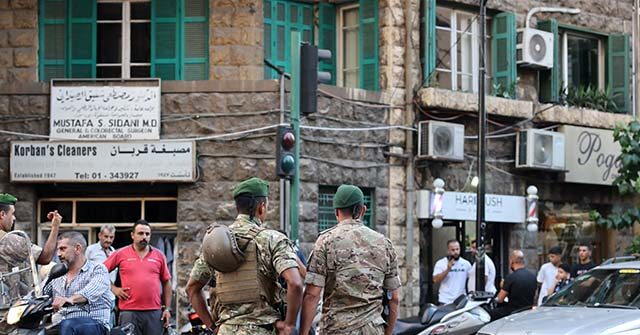We support our Publishers and Content Creators. You can view this story on their website by CLICKING HERE.

The U.S. State Department insisted on Tuesday that it had no prior knowledge of or involvement in a string of explosions apparently targeting Hezbollah terrorists throughout Lebanon and Syria.
State Department spokesman Matthew Miller refused to offer specific answers on multiple questions during his press briefing on Tuesday regarding the explosions, insisting the administration of President Joe Biden was still “collecting information” and did not want to address the situation without having a better grasp on what happened.
At the Pentagon, Press Secretary Maj. Gen. Pat Ryder similarly refused to offer any detailed reply to the explosions, insisting he had no “information to provide” reporters on the topic. Ryder did state that, to the best of his knowledge, no members of the Defense Department were currently using pagers.
Reports indicate that hundreds of pagers – archaic hand-held communication devices prevalent in the era prior to the prevalence of mobile phones – exploded simultaneously in multiple cities in Lebanon and some parts of Syria. The pagers were reportedly in possession of hundreds of Hezbollah terrorists, who used the devices to avoid Israeli infiltration of their communications. The situation caused panic in Lebanon as videos of abrupt explosions at the hips of targets in supermarkets and other public spaces began propagating. The Emirati newspaper the National reported chaos at Lebanon’s hospitals, some receiving dozens of patients at once with insufficient resources to properly respond.
“The Lebanese Red Cross said more than 30 of its ambulances were being used throughout the country and that 50 additional ambulances had been put on high alert,” the National added.
As of Tuesday night, Lebanese authorities confirmed nine deaths, including at least one child, and upwards of 2,700 people wounded by exploding pagers. Among those injured by the pagers was the Iranian ambassador to Lebanon, suggesting that he was part of the Hezbollah communications network that the attack appeared to target.
The government of Israeli has widely been identified as the power behind the attack, though Israeli officials have not taken responsibility or commented at press time. Both Lebanese officials and Hezbollah terror leaders claim that they have evidence Israel orchestrated the attack, according to the Hezbollah-tied propaganda outlet al-Mayadeen.
The incident occurred shortly before Secretary of State Antony Blinken was expected in Cairo, Egypt, for meetings with senior government officials, some focused on diplomatic efforts to end the war between Israel and the Sunni terrorist organization Hamas. While Hezbollah is a Shiite terror gang, it shares its patron Iran, the world’s premier state sponsor of terrorism, with the Iranian regime and has supported Hamas in the aftermath of its barbaric attack on civilians in Israel in October 2023.
Miller, the State Department spokesman, avoided discussion potential explanations for the explosions in Lebanon save to assert that Washington had no foreknowledge of any such attack and did not participate in it.
“We are gathering information on this incident. I can tell you that the U.S. was not involved in it, the U.S. was not aware of this incident in advance,” Miller told reporters. “And at this point, we are gathering information.”
“We’re collecting information in the same way that journalists are across the world to gather the facts about what might have happened,” Miller added, suggesting the Biden administration was kept out of the loop regarding operations against Hezbollah terrorists in Lebanon.
Miller suggested it was “too early” to determine if the pager incident would have any impact on attempts to negotiate a ceasefire between the Israeli government and Hamas in Gaza, the territory Hamas used to launch its October 7 siege of Israel. He noted that, in support of Hamas, Hezbollah has launched a terror campaign against northern Israel that has made the territory uninhabitable for tens of thousands of rightful residents, but then drew a false equivalence between Israel’s self-defense operations and Hezbollah’s attacks. The Israeli government estimates that around 60,500 of its citizens have been displaced as a result of Hezbollah attacks on the northern border since October 7.
“We agree that it is unsustainable for tens of thousands of Israeli families to be displaced from their homes, just as it is unsustainable for tens of thousands of Lebanese families to be displaced from their homes,” Miller said, later adding, “Our judgment that a diplomatic solution is the best way to get them back to their homes. Because if you look at what a military conflict would entail, it’s hard to see how that gets those families on either side of their border back to their homes quickly.”
Miller also insisted that resolving Hezbollah’s campaign against northern Israel would be “very difficult” without also ending the war on Hamas.
Given the apparent irrelevance of the U.S. government in the current Mideast turmoil following October 7 and Biden’s repeated failures to negotiate a ceasefire or properly support Israel in seeking the total destruction of Hamas, a journalist asked Miller if the State Department still believed its influence could still limit the scale of the conflict, “because it seems that it’s slipping from your hands.”
Miller responding that the question was “not just a question for the United States” and that the Biden administration is “involved in this because we see it as our responsibility, as one of the world’s powers,” rather than because of its extensive – and, according to Biden, “ironclad,” alliance with Israel.
Miller also offered little clarity on why Blinken is traveling to Egypt with no scheduled stops in Israel, other than to claim no ceasefire proposal is ready “to present to Israel at this point.”
The absence of American leadership in the face of the shocking news from Lebanon on Tuesday recalled the Biden administration’s similar attempts to distance itself from the killing of Hamas “political” chief Ismail Haniyeh in July. Haniyeh was reportedly killed in his temporary lodgings while on a visit to Tehran to attend the inauguration of President Masoud Pezeshkian on July 30.
“This is something we were not aware of or involved in,” Blinken said at the time, adding, “It’s vitally important to help end the suffering of Palestinians in Gaza. It’s vitally important to get the hostages home, including a number of Americans.”
Hamas took an estimated 250 hostages on October 7, of which about 100 are believed to remain in captivity as of this week.
Biden has accused the Israeli government, which has endeavored to rescue the hostages from Gaza, of not doing enough to reach a deal with Hamas to free them as recently as early September.
His vice president and the current Democrat Party nominee for president, Kamala Harris, insisted in remarks this week that she would maintain Biden’s foreign policy on Israel and the Middle East if elected in November.
“We need to get this [ceasefire] deal done, and we need to get it done immediately. And that is my position, and that is my policy. We need to get this deal done,” she asserted.

 Conservative
Conservative  Search
Search Trending
Trending Current News
Current News 







